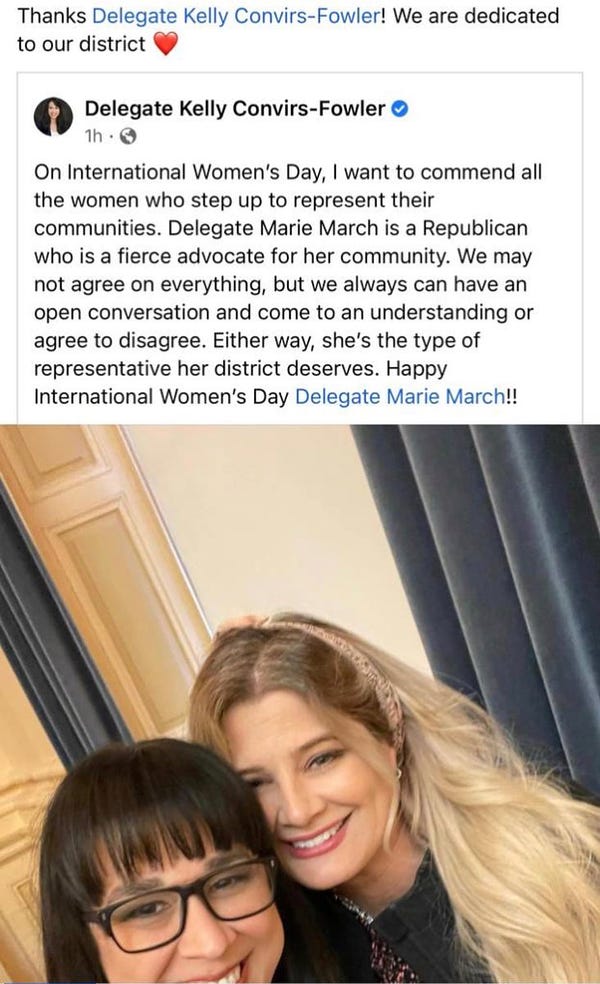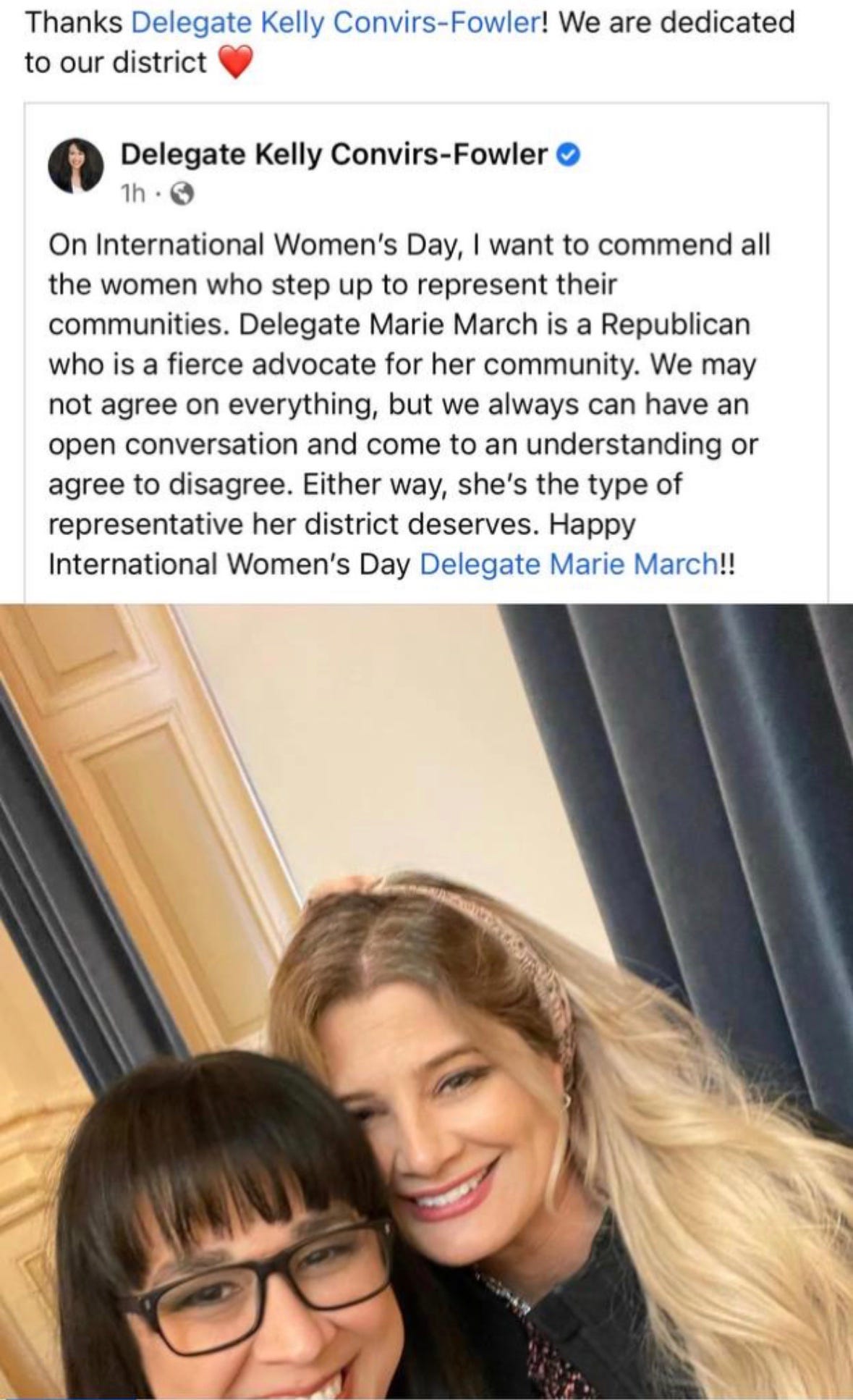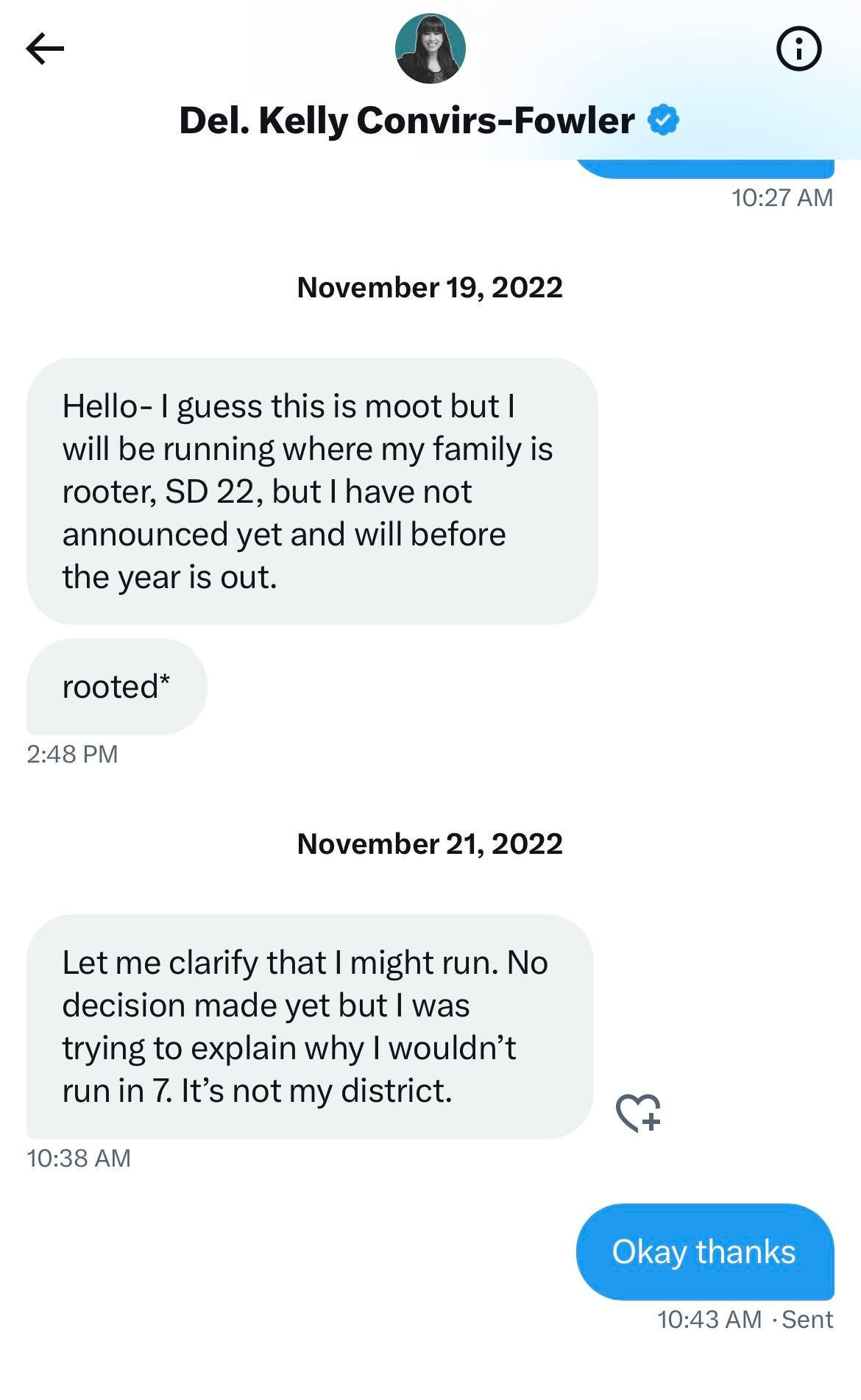Convirs-Fowler blames men for Marie March's inability to pass legislation
She also is beefing with Susan Hippen
This is a daily newsletter covering Virginia politics from top to bottom. Please consider becoming the ultimate political insider by supporting non-partisan, independent news and becoming a paid subscriber to this newsletter today.
Have a tip? You can reply to this email, or email me directly at Brandon@virginiascope.com
Today’s Sponsor: AFP-Virginia
“AFP Virginia is having events across the state highlighting our Pathway for Virginia’s Future and the progress we made this legislative session. We’ll be inviting legislators to celebrate the work they did to help build the future Virginians’ deserve. Join us at an event near you to meet your legislator(s) and learn more about what AFP Virginia worked on this session and what we’re building for throughout the year.”
Sorry for the lack of content the last two days. Strep throat really knocked me down — but I’m back! Here are some key headlines that I would have covered:
Delegate Matt Fariss of Campbell County is facing three charges after Virginia State Police said he was the driver in a hit-and-run incident that injured a woman on Thursday.
Former Speaker of the House Eileen Filler-Corn announced she would not be seeking reelection to the House of Delegates later this year.
State Sen. Lynnwood Lewis will not be seeking reelection to the state Senate.
Rep. Jennifer McClellan (D) was sworn into Congress as the first Black woman to represent Virginia in the House of Representatives.
Kelly Convirs Fowler blames men for Marie March’s bills not passing. She also is beefing with a Democrat she formerly endorsed and is now running against.
Democratic Del. Kelly Convirs-Fowler blamed men in the General Assembly for not passing Del. Marie March’s legislation. March is one of the most conservative members of the House and introduced a bill this year that would have banned abortion in Virginia.
Convirs-Fowler posted a picture with March on Wednesday in honor of International Women’s Day.
A fake account then posted the screenshot from Facebook onto Twitter and Convirs-Fowler responded.


“This troll page has no respect for the ability to work together,” Convirs-Fowler said. “Obviously a man runs this page. #sexist the men didn’t give her bills hearings versus passing most of her opponents bills. At least SHE voted FOR her district.”
It is worth noting that Convirs-Fowler is criticizing men for not bringing votes to the House floor that would have taken rights away from women.
“The people of her district need her to work with the other side to get things done,” Convirs-Fowler continued. “Just like my district relies on me to work with republicans to get things done. So hopefully the repubs can figure out that the men should stop putting politics over people.”
There are plenty of women in the Republican caucus who actively pass legislation. Del. Carrie Coyner (R) was one of the most successful members of the House of Delegates this year. She is also often the target of attacks from March who believes Coyner is too moderate.
In an email, on Feb. 3, March criticized several Republican colleagues (Wampler, Coyner, JL Campbell, and Tommy Norment) for voting against different bills she introduced this year. “Do these people have no shame?” she wrote to her followers.
March has also bragged about bullying members of her caucus into supporting her legislation. At a Montgomery County GOP meeting last year, March talked about lobbyists using robocalls in Speaker Todd Gilbert’s district to advance her bill.
Related: Chase and March's opponents endorse each other
State Sen. Amanda Chase, a firebrand Republican who doesn’t even caucus with Republicans in her chamber praised March in a video they filmed together recently. While noting that none of March’s bills passed during session, Chase said: “There are issues that weak-kneed Republicans don’t want to touch.”
March is running against Del. Wren Williams for the Republican nomination in their district. They were drawn together during redistricting.
March pressed charges against Williams last year for assault after he bumped into her at an event. A judge eventually found Williams not guilty.
Convirs-Fowler now appears to be running for the House in HD-96. This comes after implying previously on the House floor that she didn’t plan to run for reelection.
Convirs-Fowler told Virginia Scope in November that she planned to run for the state Senate this year before changing that statement two days later.
Susan Hippen had already received support from Convirs-Fowler for the nomination — but now they are facing off.






November is still a long way away. Stay tuned.
Virginia lawmakers mandate electric vehicle fire risk training
By Adrianna Lawrence, Capital News Service
RICHMOND, Va. — Virginia firefighters will be required to complete a training program starting next year, about the risk of electric vehicle fires.
Del. Israel O’Quinn, R-Washington, proposed House Bill 2451 to require the executive director of the Virginia Department of Fire Programs to develop a training program for electric vehicle fires. The program must be developed and available by July, 1 2024, according to the bill. All firefighters, including volunteer firefighters, must complete the training by Dec. 1, 2025.
The bill unanimously passed committees and both chambers. Sen. Bryce Reeves, R-Spotsylvania, asked for one clarification in the Senate General Laws and Technology committee, about whether the program would be offered both in-person and virtual.
“I heard from some of my fire folks, and they were concerned that this is more time away,” Reeves said.
A lot of the annual firefighter training is done online, according to Reeves.
Spencer Willett, government affairs manager for the Virginia Department of Fire Programs, assured the Senate committee the training would be offered in multiple modalities.
“The agency’s plan would be to offer an online version for departments and then also offer an in-person version for those that would be willing to want to take that training,” Willett said.
The number of electric vehicles on Virginia’s roadways is set to increase with the soon-to-be implemented Clean Car law. The law states 35% of all new cars and trucks sold in Virginia with a 2026 model year must be electric. Then 100% of new models on the market must be electric by 2035, according to the law, which is based on California's final regulation order.
Del. Mike Cherry, R-Colonial Heights, a co-patron of the bill, said it is important to implement mandated training statewide, even for areas like Southwest Virginia where electric vehicles aren't prominent.
“Anytime a fire department deals with something new and unique, they will then figure out a protocol to deal with it again in the future,” Cherry said.
There is currently no mandated electric vehicle training for Virginia firefighters, according to William Boger, District 5 vice president and communications director for the Virginia Professional Fire Fighters.
However, departments can currently seek out training from car manufacturers like Tesla or Toyota, he said.
The future training program will greatly help firefighters better understand electric vehicle fires and the best ways to extinguish them, according to Boger.
Firefighters use approximately 50 gallons to 100 gallons of water to extinguish a regular internal combustion engine, or gasoline, vehicle fire while electric vehicles require about 10,000 gallons of water, according to Boger.
“They are very stubborn and very difficult to extinguish,” he said.
Most electric vehicles carry large lithium-ion battery packs underneath the vehicle, where they are not very accessible. These batteries can overheat, which leads to a reaction called thermal runaway and requires thousands of gallons of water, according to Boger.
Firefighters also need to be aware that the battery is not necessarily finished burning just because the fire is finally put out, according to Boger.
“The problem with these cars is you have to put the fire out, then you have to continuously cool the battery,” Boger said.
Some electric vehicle batteries will reignite on the way to a junkyard if the battery is not properly cooled down and observed after the fire is put out, according to Boger.
Some batteries can even catch fire two to three days later, according to Doug Reynolds, battalion chief of the Henrico County Division of Fire.
“You may have to have several tankers bringing you water, so it's not the easy, you know, fire that it used to be,” Reynolds said.
Dry chemicals and fire blankets have been used, but are not considered as effective as water, according to Boger.
Andrew Klock, senior manager of education and development with the National Fire Protection Association, said the best recommendation is still water.
“It's the most effective to date and if it's placed in the proper location, it can put out the fire and drain the heat from the battery pack,” Klock said.
Electric vehicle fires are not more threatening than gasoline vehicle fires, which occur every three minutes, Klock said.
“But I do think that the risk and the inherent problem is that firefighters have had a 100 years to figure out and perfect how to put out an internal combustion engine vehicle [fire],” Klock said. “But it's not so with this new technology or newer technology of hybrid and electric vehicles.”
Reynolds’ department looks forward to seeing the curriculum and learning everything they can about this unique type of vehicle fire, he said.
“It affects every firefighter, you know from paid to volunteer, big departments, small departments, you know, the car fires are out there every day,” Reynolds said. “So it's just better to protect us to learn how to fight those fires because it's important.”
The Virginia Department of Fire Programs will develop the training program, utilizing fire experts and industry representatives, according to Will Merritt, VDFP marketing and communications manager.
A workgroup will create the curriculum in concert with VDFP staff, Merritt stated via email. The curriculum is then “piloted, finalized and posted for registration in VDFP's learning management system, Cornerstone OnDemand,” he stated.
“As electric vehicles become more popular, it is important that Virginia’s fire service be adequately trained to fight electric-vehicle fires,” Merritt stated.






